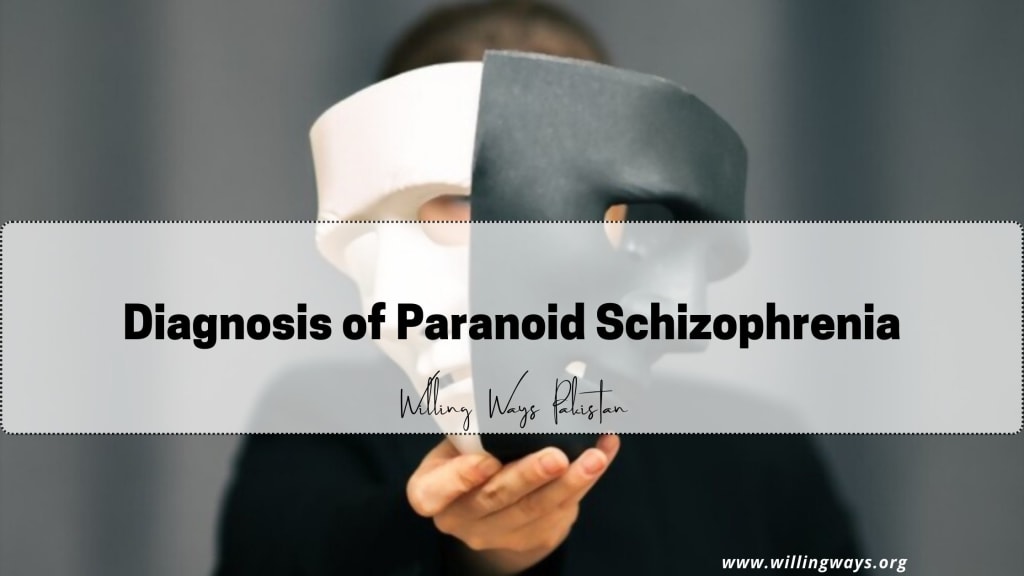Diagnosis of Paranoid Schizophrenia
There is no test that accurately at the best addiction treatment center in Pakistan diagnose Paranoid Schizophrenia; this depends entirely on the knowledge and experience of the physician; people want to know how to get rid of Schizophrenia.

There is no test that accurately at the best addiction treatment center in Pakistan diagnose Paranoid Schizophrenia; this depends entirely on the knowledge and experience of the physician; people want to know how to get rid of Schizophrenia. They can quickly get away from this disease; it is common to see diagnosis conflicts. The diagnosis is made by the set of symptoms that the patient has symptoms and history as they were emerging and evolving. There are criteria for the doctor to have a starting point, a base where life is, but the way the doctor sees the symptoms is personal. A doctor may consider insomnia that has not been given more importance in the composition of the table, as another doctor might consider it essential. So the tables are not definite, or atypical diagnosis can lead to conflict.
Paranoid Schizophrenia Symptoms
The Course
That Schizophrenia is undoubtedly a severe disease because it affects emotions, thinking, perceptions and behaviour. But what about gravity that one can not sequels or threaten a person's life but instead allows the restoration of normalcy? Gravity is not so much the diagnosis: it is more in the course of the disease.
Classically, Kraepelin made the distinction between Paranoid Schizophrenia (dementia praecox) and bipolar disorder (psychosis cyclic) was the possibility of recovery of cycling, while the deteriorated schizophrenic and not recovered. Maybe from there, it created a tendency to Schizophrenia is considered unrecoverable. There is little doubt that many cases do not recover, but there are exceptions, and when they arise throughout, the rule becomes doubtful since one loses the limits on which it was operating safely. Two primary reasons justify the lack of security throughout Schizophrenia:
- Lack of uniform criteria in the past research on the subject.
- Difficult to follow over several years with a large group of patients.
It's only a little over ten years since the World Health Organization edited transparent and objective criteria for the diagnosis of Schizophrenia. In the previous version, ICD 9, the criteria were "loose," allowing considerable differences between the parameters adopted in the studies. Hence, the differences in results between them were unacceptable, ending the uncertainty about the course of Schizophrenia. Some are naturally transient psychosis and unique in the life of a person. If, by mistake, these are considered to be schizophrenic, conflict is generated when compared with studies whose criteria required a minimum period of months in the duration of psychosis. Even the last many year's psychoses can not be confused with the schizoid personality. Thus, due to the lack of rigour in the diagnostics can not be safe in previous studies of the ICD-10 or DSM-III (for studies that were based on American criteria), the conclusions of these studies can not determine our current conduct. Although ICD-10 has created a technique proven to be more reliable and accurate in diagnosing Schizophrenia is not the problem resolved. Only with time and more research will the criteria adopted today be correct and correspond to reality. If it is found that in the future still needs to be improved, surveys of the ICD-10 will also be discredited. The research must say if we're diagnosing a disease with many natural resources or are several diseases, each with its proper course. Given these difficulties, we understand why they are so desired biological techniques, such as the image of positron emission tomography, to study Schizophrenia.
Among several studies published over the last decade on the course of Schizophrenia, we selected one to illustrate the diversity of outcomes and difficulty in evaluation. The more complex analysis of a study, the more subject to failure, and it needs corrected conclusions.
In this study, we selected six people who had completed ten years earlier criteria for Schizophrenia, and all achieved remission of symptoms. With this type of study, it is possible to verify that the remission would be detected at the time permanent or a phase of permanent improvement before chronicity. As a result, even so, as a small group, we found several different courses. Three remained in complete remission; a deteriorating course followed a continuous, and two had fluctuating symptoms. No clinical differences were identified that distinguished patients. To tell if the patient was with or without psychotic symptoms was used a structured questionnaire was to interview all accurate, so possible "defects" left by previous psychosis.
In this study, we can see that complete remission is no guarantee of cure. This is seemingly trivial as it is essential in the relationship with the patient and his family; for that, 100% of them will wonder if they are suitable and will turn to what they were. At the moment, no mental health professional can tell what will happen. To say that will not improve an iatrogenic cause, saying it'll be good can be deceiving, ultimately costing the trust in the profession.
About the Creator
Willing Ways
Willing Ways is the Best addiction treatment center in Pakistan. We are the pioneer in drugs & alcohol treatment centers with outstanding services and a history of 43 years. We deliver quality writing that is beneficial for you.






Comments
There are no comments for this story
Be the first to respond and start the conversation.